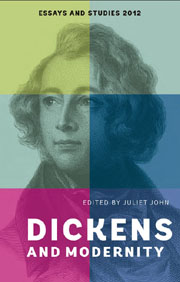Book contents
- Frontmatter
- Contents
- LIST OF ILLUSTRATIONS
- ACKNOWLEDGEMENTS
- NOTES ON THE CONTRIBUTORS
- INTRODUCTION
- 1 THE DICKENS TAPE: AFFECT AND SOUND REPRODUCTION IN THE CHIMES
- 2 DICKENS, SEXUALITY AND THE BODY; OR, CLOCK LOVING: MASTER HUMPHREY'S QUEER OBJECTS OF DESIRE
- 3 TEXTS, PARATEXTS AND ‘E-TEXTS’: THE POETICS OF COMMUNICATION IN DICKENS'S JOURNALISM
- 4 CORPUS STYLISTICS – DICKENS, TEXT-DRIVENNESS AND THE FICTIONAL WORLD
- 5 THINGS, WORDS AND THE MEANINGS OF ART
- 6 DICKENS AND THE CIRCUS OF MODERNITY
- 7 THE OLIVER! PHENOMENON; OR, ‘PLEASE, SIR, WE WANT MORE AND MORE!’
- 8 ‘WOW! SHE'S A LESBIAN. GOT TO BE!’: RE-READING/RE-VIEWING DICKENS AND NEO-VICTORIANISM ON THE BBC
- 9 OUT OF PLACE: DAVID COPPERFIELD'S IRRESOLVABLE GEOGRAPHIES
- 10 AFTERWORD: THE 2012 BICENTENARY
- Index
5 - THINGS, WORDS AND THE MEANINGS OF ART
Published online by Cambridge University Press: 05 February 2013
- Frontmatter
- Contents
- LIST OF ILLUSTRATIONS
- ACKNOWLEDGEMENTS
- NOTES ON THE CONTRIBUTORS
- INTRODUCTION
- 1 THE DICKENS TAPE: AFFECT AND SOUND REPRODUCTION IN THE CHIMES
- 2 DICKENS, SEXUALITY AND THE BODY; OR, CLOCK LOVING: MASTER HUMPHREY'S QUEER OBJECTS OF DESIRE
- 3 TEXTS, PARATEXTS AND ‘E-TEXTS’: THE POETICS OF COMMUNICATION IN DICKENS'S JOURNALISM
- 4 CORPUS STYLISTICS – DICKENS, TEXT-DRIVENNESS AND THE FICTIONAL WORLD
- 5 THINGS, WORDS AND THE MEANINGS OF ART
- 6 DICKENS AND THE CIRCUS OF MODERNITY
- 7 THE OLIVER! PHENOMENON; OR, ‘PLEASE, SIR, WE WANT MORE AND MORE!’
- 8 ‘WOW! SHE'S A LESBIAN. GOT TO BE!’: RE-READING/RE-VIEWING DICKENS AND NEO-VICTORIANISM ON THE BBC
- 9 OUT OF PLACE: DAVID COPPERFIELD'S IRRESOLVABLE GEOGRAPHIES
- 10 AFTERWORD: THE 2012 BICENTENARY
- Index
Summary
We next went to the School of Language, where three Professors sate in Consultation upon improving that of their country.
The first Project was to shorten discourse by cutting Polysyllables into one, and leaving out Verbs and Participles, because in reality all things imaginable are but Nouns.
The other Project was a Scheme for entirely abolishing all Words whatsoever; and this was urged as a great Advantage in point of Health as well as Brevity. […] An Expedient was therefore offered, that since Words are only Names for Things, it would be more convenient for all Men to carry about them, such Things as were necessary to express the particular Business they are to discourse on. […M]any of the most Learned and Wise adhere to this New Scheme of expressing themselves by Things, which hath only this Inconvenience attending it, that if a Man's Business be very great, and of various kinds, he must be obliged in Proportion to carry a greater Bundle of Things upon his Back, unless he can afford one or two strong servants to attend him. I have often beheld two of these Sages almost sinking under the Weight of their Packs, like Pedlers among us; who when they met in the Streets would lay down their Loads, open their Sacks and hold Conversation for an hour together; then put up their Implements, help each other to resume their Burthens, and take their Leave.
- Type
- Chapter
- Information
- Dickens and Modernity , pp. 115 - 132Publisher: Boydell & BrewerPrint publication year: 2012

